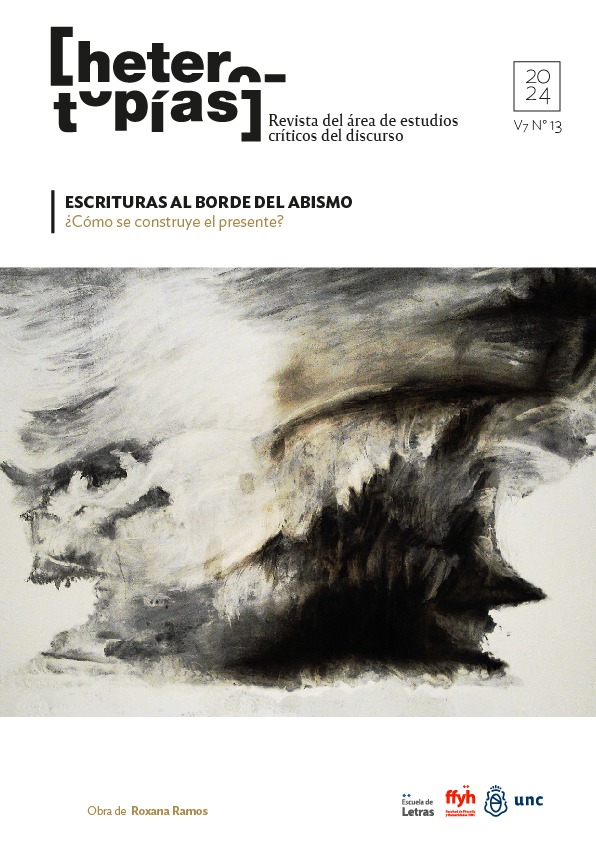Do the Jetsons dream of wild sheep? A killjoy reading of the economic singularity by Javier Milei
Main Article Content
Abstract
In the following paper we will undertake a critical, spoilsport, and pessimistic reading, as the author in question would say, of the article "From the Flintstones to the Jetsons: Wonders of Technological Progress with Convergence" (2014) by Javier Milei, then Chief Economist of Fundación Acordar. To do so, we will reconstruct the narrative of the future proposed by Milei, focusing on his theoretical assumptions (mainly the economic Singularity), the epistemological operations that establish the regime of truth of his arguments (what we call here Statistical Providentialism) and the techno-economic optimism that shapes his vision of history past, present and to come.
Downloads
Article Details
Section

This work is licensed under a Creative Commons Attribution-NonCommercial-ShareAlike 4.0 International License.
Those authors who have publications with this journal, accept the following terms: Those authors who have publications with this journal, accept the following terms:
a. The authors will keep their copyright and guarantee to the journal the right of first publication of their work, which will be simultaneously subject to the Creative Commons Attribution - Non-Commercial - Share Alike (by-nc-sa) Attribution License; no commercial use of the original work or any derivative works is allowed, the distribution of which must be done with a license equal to the one that regulates the original work.
b. Authors may adopt other non-exclusive license agreements for the distribution of the published version of the work (e.g., deposit it in an institutional telematic archive or publish it in a monographic volume) provided that the initial publication in this journal is indicated.
c. Authors are allowed and recommended to disseminate their work through the Internet (e.g. in institutional telematic archives or on their website) before and during the submission process, which may lead to interesting exchanges and increase the number of citations of the published work. (See The effect of open access).
How to Cite
References
Aibar, E. (2022). Imaginación tecnológica e ideología de la innovación. Artnodes, (29). UOC. Recuperado de: https://doi.org/10.7238/artnodes.v0i29.393017
Antonelli, M. (julio-agosto de 2014). Megaminería transnacional e invención del mundo cantera. Nueva Sociedad (252), 72-86.
Bell, D. (1984). Las ciencias sociales desde la Segunda Guerra Mundial. Madrid: Alianza Editorial.
Costa, F. (2021). Tecnoceno. Algoritmos, biohackers y nuevas formas de vida. Madrid: Taurus.
Ford, M. (2016) El auge de los robots. La tecnología y la amenaza de un futuro sin empleo. Buenos Aires: Paidós.
Garcés, M. (2022). Imaginación crítica. Artnodes, (29). UOC. Recuperado de: https://doi.org/10.7238/artnodes.v0i29.393040
Hottois, G. (2016). ¿El transhumanismo es un humanismo? Bogotá: Universidad del Bosque.
Milei, J. (mayo-agosto de 2014). De los Picapiedras a los Supersónicos: Maravillas del Progreso Tecnológico con Convergencia. Actualidad Económica, XXIV(83), 5-18. Recuperado de: https://revistas.unc.edu.ar/index.php/acteconomica/article/view/9532
More, M. y Vita-More, N. (2013) Part VIII Future Trajectories: Singularity. En M. More y N. Vita-More (eds.), The transhumanist reader. Classical and Contemporary Essays on the Science, Technology, and Philosophy of the Human Future (pp. 361-365). Wiley-Blackwell.
rodríguez freire, r. (2012). Notas sobre la inteligencia precaria (o sobre lo que los neoliberales llaman capital humano). En r. rodríguez freire y M. Tello (eds.), Descampado. Apuntes sobre las contiendas universitarias (pp. 101-155). Santiago de Chile: Sangría Editora.
Sadin, E. (2018). La silicolonización del mundo. La irresistible expansión del liberalismo digital. Buenos Aires: Caja Negra.
Singularity University. (2024). About Us. Singularity University. Recuperado de https://www.su.org/about-us
Tucker, J. (2011). It´s a Jetsons world: private miracles and public crimes. Alabama: Ludwig von Mises Institue.
Vaccari, A. (2013). La idea más peligrosa del mundo: hacia una crítica de la antropología transhumanista. Tecnología & Sociedad, 1(2), 39-59.
Van Zaden, J. L. (2005). Una estimación del crecimiento económico en la Edad Moderna. Investigaciones de historia económica (2), 9-38.
